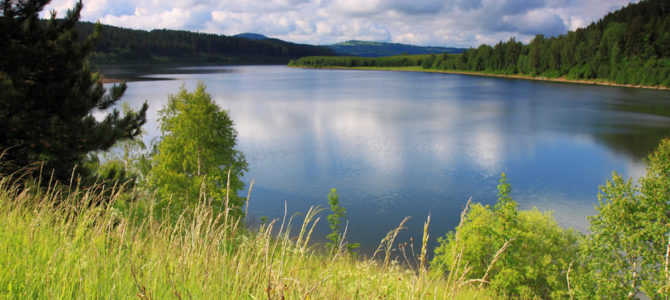
With President Trump’s withdrawal from the Paris climate agreement, Republicans stand at a crossroads. They must elucidate and emphasize what they stand for regarding environmental sustainability.
Many in the GOP have pressured President Trump to do away with the Clean Power Plan, and to withdraw from the Paris climate agreement. To them, yesterday’s decision is a welcome one. But Republicans have had a hard time explaining what they’re for, in the midst of condemning what they’re against.
To approach all environmental concern—all pleas to diminish carbon emissions, all cries for more sustainable approaches to energy use, land, and water—with scorn is not just to permanently estrange the GOP from the Left. It’s to threaten permanent damage to our seas, land, and citizens, as well.
Conservatives Are Meant to Conserve
The word “conservative” contains—vitally—the verb “conserve.” True conservatism shouldn’t just suggest a reverence for the Constitution and the Founding Fathers, for religion and tradition. It should also involve a reverent and thoughtful stewardship of the resources we’ve been given. Conservatism is, in part, about understanding the importance of limits: the ways in which fallible and errant human beings often go too far, and reach past prudential restraint in our sinful efforts at ascendancy.
Ironically, conservatives ought to be first to ask the question, “Are our habits and patterns, as consumers and businesses, sustainable?” But we’ve been playing second fiddle to progressives, who’ve embraced environmental reforms wholeheartedly and now seek to achieve reform via centralized governmental oversight.
Progressives can sound and act hyperbolic about climate change. But ultimately, such frenzy shouldn’t stop us from taking decisive action. If we think there is a better way of operating in and for our planet—if there’s even a chance that dumping waste into seas or landfills could hurt future generations—we should be concerned. And we should respond accordingly.
It’s true that Obama’s measures for environmental sustainability came via top-down measures that can hamper innovation and creativity. It’s true that some of the measures offered in the Paris climate agreement could have resulted in cronyist subsidies and “egregious regulation.” And we know from practice that such things often entrench bad policies and ineffective business practices in bureaucracy, fossilizing futility and making true reform impossible. That’s not what we want.
So what is the conservative alternative?
Foster Private And Local Sustainability
A lot of corporations are increasingly interested in making their work more sustainable. We need to harness this energy and curiosity, and use it to foster more creativity and innovation in the realm of environmental sustainability. When we incentivize private businesses to devise more sustainable, clean means of doing business, we can help create an infrastructure that supports—rather than undermines—stewardship.
The R Street Institute has already sought to promote such an attitude to environmental policy, suggesting ways in which we can encourage the free market to foster sustainability and reform in the future. The shifts this involves may, indeed, result in short-term struggles (though hopefully not). But long-term, such initiatives would further the interests of companies (and would, indeed, create jobs).
When we incentivize private citizens to embrace more thoughtful, mindful means of consumption and creation in their homes, we help them see the planet as theirs to care for and steward, not just the government’s. We start building the habits of virtue that create sustainable long-term change. Tax incentives can also help push this ball forward, and perhaps should be considered more fully at a state level. But it’s important to note that stringent tax punishments (such as Maryland’s Rain Tax) can, in fact, make voters feel hostile toward—rather than excited about—environmental sustainability.
We need people like Elon Musk to devise new and inventive ways to make solar panels available to American citizens. We should rethink our car-centric urban planning, and consider reform measures that promote more sustainable means of transportation—making it easier for commuters to walk, bike, take the bus or the metro, etc. We ought to emphasize the egregious horrors of food waste (and other forms of waste) in our country, and encourage citizens to live in a more sustainable fashion (composting, anyone?). We ought to discuss agricultural policy, and the ways our crony capitalism fosters farming policies that are bad—in the long- and short-term—for our planet.
When our discussion of the environment focuses primarily on large global plans like the Paris climate agreement, we can disincentivize private and local action. We can make caring for the environment seem like some far-off ideal, only achievable by the most powerful of people.
But some of the most important climate and ecological initiatives can and should happen on a grassroots level. The people who convinced me I should care about our planet and its resources weren’t government bureaucrats. They were friends and family members who composted and recycled.
They were brilliant authors and farmers like Joel Salatin, Wendell Berry, and Shannon Hayes, who emphasize a more sustainable, mindful way of living—and convinced me to remodel my household and its workings accordingly. Facebook videos that promote less food waste and trash have helped families I know realize how much they’re dumping in the bin. A church park cleanup day helps promote a well-stewarded community. Walking to the metro every day, instead of commuting, is one act that can prompt an overflow of similar change.
We Should Be More Than Reactionaries
Conservatives ought to mind the natural-born limits God has imposed upon his earth and his people. We ought to be cautious and prudent in using the resources we’ve received. If we’re hurting our planet via bad habits and practices, I don’t think God’s going to give us a free pass (sorry, Rep. Walberg).
Lots of people I grew up with didn’t think twice about what they ate or where it came from, the cars they drove or the way they consumed energy. And I can understand why they didn’t: no one they trusted—none of the religious or political leaders who formulated their conservative orthodoxy—explained why such things should matter. But they should.
In the wake of Trump’s decision to withdraw from the Paris climate agreement, if conservatives don’t offer alternative ideas for ecological sustainability, progressives will convince voters that they’re the only ones who care for the planet. And conservatives shouldn’t let that happen. We’re conservatarians—it’s in our name.









